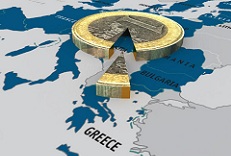Who Ultimately Owns Greek Bank Accounts?
July 29th, 2015

If you are a fan of spy novels, then recent press reports about how the former Greek Finance Minister Yanis Varoufakis and five others under his watch had hatched a plan to launch a “parallel banking system” will be as utterly fascinating to you as they were to me. While probably released for political purposes, the implications this story has on how Europeans perceive their country’s oversight and governance of basic security protocols and controls, particularly having to do with online accounts of all shapes and sizes, are huge. The issues raised present a rare public discussion into how governments perceive their countrymen’s assets and holdings.
- Basic Controls for Money Laundering & Fraud: Can you imagine the first few weeks of such a system being launched if it had happened? Do you think the plan’s authors gave thought to how the control mechanisms that the country relies upon might not be in place in time? Can you imagine how significant of a hole this would provide to financial criminals intent on defrauding people, moving monies among accounts, and leveraging money mules?
- Online Passwords: In light of this evidence, who is the average citizen supposed to trust? According to news reports “passwords used by Greeks to access their online tax accounts were to have been secretly copied and used to issue new PIN numbers for every taxpayer to be used in transactions with the state.” This revelation is simply mind-boggling. We know that most people pick terrible passwords and then re-use those terrible passwords over and over. This combination means that placing what is probably a not-very-unique password into the state’s hands exposes Greek citizenry to the fact that their non-financial accounts are potentially accessible to this small team of six people!
- Business Continuity: Did the group have any Business Continuity plans? RegSCI or a full-blown hot-hot data center arrangement might have been overblown, but what did this team put in place to ensure that the newly-created PINs would be backed up if such a system were to really get off the ground? Were they planning to covertly copy the passwords, create the new PINs, and then copy it onto a thumb drive or keep it in their Google Drive? Do we think this team understands encryption or even basic hashing technology?
- Customer Experience: Most of us hate to create our new PINs and particularly dislike it when new ones are created for us (see above about re-using passwords). The user experience of this entire situation would’ve been laughable. Do you think that citizens would’ve been informed that they could call the government’s Help Desk in order to change their PIN? Can you imagine the user frustration and the burden on the government’s call centers or office lines in this scenario?
- Cryptocurrencies Anyone?: While much has been written about the possibility of a Greek exit from the European Union, it would be irresponsible to discuss this topic without diving into the possibility of the use of cryptocurrencies like Bitcoin. I don’t agree with the speculation that Greece could have executed a rapid switch to a crypto-based currency and I also don’t believe that the Grexit concerns caused the price of Bitcoin to spike. But, I do have this question for the team working on “Plan B”: “Why go drachma when you could go crypto?” Sure the users might be confused and you’re putting your economy in the hands of the masses instead of the hands of the EU, but it would give you a massive boost in terms of how outsiders view your country’s innovation. And it would certainly put you in the history books for an entirely different reason.




